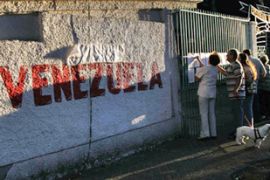Venezuela vote ‘too close to call’
Vice-president pledges to respect result on referendum over constitutional changes.

| In Video |
|
Your Views |
|
“Chavez is a very popular president still and he is counting on his own personal appeal to get the vote out in his favour” |
An emboldened opposition and recent violent clashes during street protests have created fears of a potentially volatile dispute.
At the very least, they would grant Chavez direct control over the central bank, allow his government to detain citizens without charge during a state of emergency, and empower the president to redraw the country’s political map and handpick provincial and municipal leaders.
Other proposed changes – such as shortening the workday from eight hours to six, creating a social security fund for millions of informal labourers and promoting communal councils where residents decide how to spend government funds – have been welcomed by supporters.
‘Close’ vote
While the government has touted polls showing Chavez ahead, other surveys cited by the opposition have indicated strong resistance, which would present a challenge for a leader who won re-election last year with 63 per cent of the vote.
| Constitutional changes |
|
A Chavez victory would mean:
Two-term presidential limit abolished to allow him to keep contesting polls
He takes control of country’s erstwhile autonomous central bank
Work day cut from eight hours to six
Voting age lowered from 18 to 16
Social security benefits extended to informal workers |
Luis Vicente Leon, a pollster, said tracking polls by his firm Datanalisis in the past week show the vote is too close to predict.
Which side wins will depend largely on turnout among Chavez’s supporters and opponents, he said.
“If he wins by a very small margin, that’s a scenario filled with conflict,” Leon said.
“In a country where there are high levels of mistrust between the camps, it’s obvious the opposition … would think it was fraud.”
The opposition has called for close monitoring of the results, raising tensions before a vote on changes that would extend presidential terms from six to seven years, create new forms of communal property, and let Chavez seek re-election in 2012 and beyond.
About 100 electoral observers from 39 countries in Latin America, Europe and the US are on hand, plus hundreds of Venezuelan observers, the National Electoral Council said.
Chavez has accused his opponents of plotting to discredit the legitimate results of what he says will be a “knockout” at the polls, saying his enemies enjoy support from Washington.
Manuel Rosales, a Venezuelan opposition leader and the governor of Zulia state, recalled before a crowd of supporters on Friday night that he conceded defeat in the 2006 presidential race and urged Chavez to do the same and “recognise the will of the people”.
